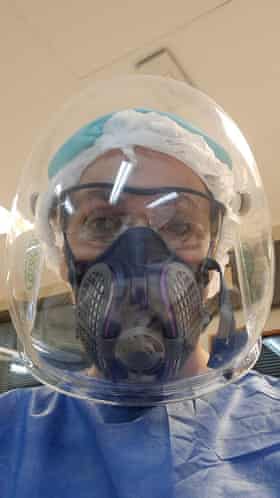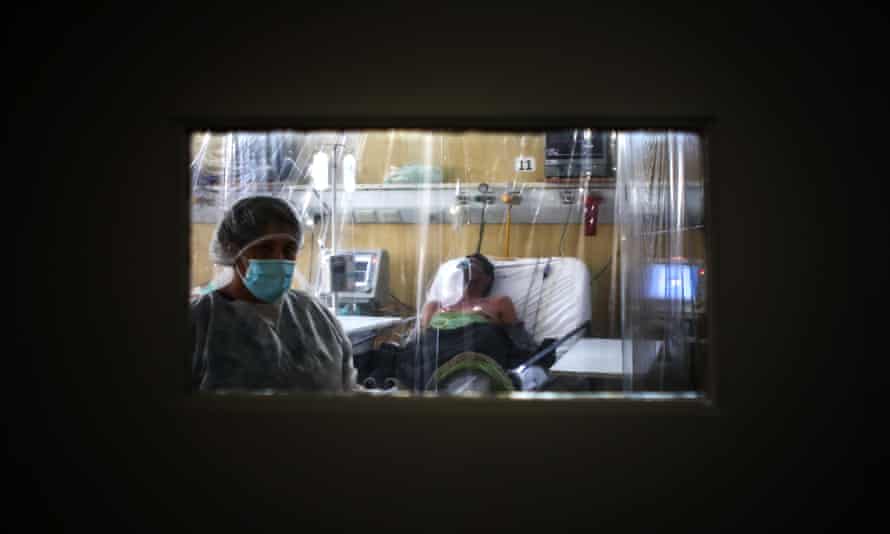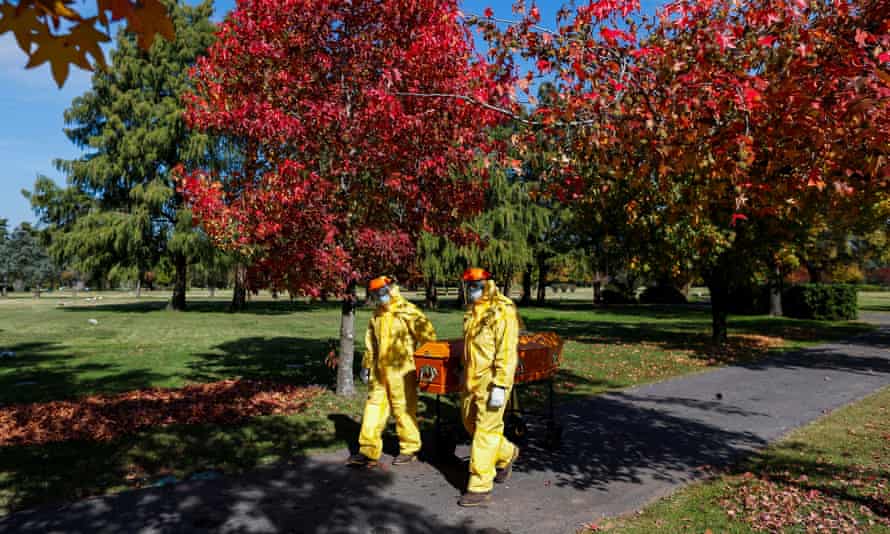‘People die in less than a week’: Covid wave catches Argentina off-guard | Global development
It is 1am, and intensive care doctor Vanina Edul is trying vainly to remember the names of all the Covid patients who have died on her watch.
The 47-year-old physician still remembers the first patient she saw die of Covid last year. “He was 60, and we were surprised because that was young for that long-ago time. We thought only old people died. How wrong we were,” she says.
With both the Brazilian and UK variants circulating widely in Argentina, the patients she is now seeing at the Fernández public hospital in Buenos Aires are dying faster, and younger: one recent victim was just 42 when he died.

“I am seeing people die in less than a week – young patients unresponsive to treatment. You administer oxygen, do all the mechanics – turn them face down, face up – but it doesn’t work. Then there are other patients whose oxygenation level is not so bad – but they die anyway,” Edul says.
A devastating second wave of Covid cases has caught Argentina off-guard, with relaxed restrictions and a low vaccination rate. Cases have risen from a daily total of about 5,000 in early March to a record 35,000 this week, while deaths surged from 112 at the start of March to a record 744 on Tuesday. On Wednesday daily contagions set a new record, just under 40,000 cases, while deaths dropped to 494.
The figures put the country third in daily cases after India and Brazil, and fourth in Covid deaths, after India, Brazil and the US.
Relative to population, Argentina now has the highest number of Covid deaths per day in the world, with 16.46 Covid fatalities per million on Tuesday, far exceeding its giant neighbour Brazil, which saw 11.82 per million.
“With these latest numbers we can expect a total catastrophe within 10 days,” says Edul. “Thirty-five thousand new cases on Tuesday means 1,500 patients entering intensive care in 10 days – and I just don’t know where we’re going to put them.”
ICUs are already stretched to breaking point across Argentina, with more than 90% of ICU beds occupied in the main provinces of Buenos Aires, Córdoba, Neuquén and the nation’s capital, according to a census last week by the Argentine Intensive Care Society (SATI). Covid patients are overflowing into pediatric or cardiology wards, and sometimes even hospital hallways.
“Argentina is in a situation of sanitary collapse. Our hospitals are overflowing and the weak link in the chain is our intensive car units, which have insufficient technological and human resources, supplies or medicines,” said Arnaldo Dubin, head of intensive care at the Otamendi private hospital in Buenos Aires.
“The marker of this collapse is the abrupt increase in mortality: some regions are reporting a mortality rate of 75% in intensive care,” he said.

Argentina’s Covid patients are overflowing into makeshift ICUs set up in pediatric or cardiology wards, and sometimes even in hospital hallways.
Despite the horrifying figures, few Argentinians seem aware of the gravity of the pandemic, Edul said: many people are disregarding restrictions, attending clandestine parties or refusing to wear a face mask.
“We are witnessing the failure of a foolish and stubborn society, a dehumanizing society in which our own interests are routinely privileged above those of our neighbours.”
And the situation has been compounded by the politicization of the pandemic, with midterm legislative elections approaching this October and presidential hopefuls for the 2023 general elections already competing for nomination.
Argentina’s centre-right political opposition coalition Together For Change has fought tooth-and-nail against the restrictions that the progressive Peronist administration of president Alberto Fernández has sought to impose, claiming the health measures are a restriction of personal freedoms.
“I’m not taking away anyone’s freedom,” Alberto Fernández, the president, said on Tuesday. “I’m applying the resources that science recommends.”
In recent weeks the opposition fought Fernández all the way to the supreme court to overturn a presidential edict closing schools as part of a package of restrictions to combat the second wave, arguing that contagion in the classroom is negligible. The court allowed schools in the city of Buenos Aires to continue holding classes.
The Buenos Aires mayor, Horacio Rodríguez Larreta, who hopes to win the coalition’s nomination for the presidency in 2023, fought particularly hard against the closure of schools, hoping not being outgunned by other presidential hopefuls within his coalition – such as former minister of security Patricia Bullrich – who are even more critical of the current Peronist administration.
“There’s an attitude of: ‘People are going to die but I have the right to carry on with my life the way I used to,’” said Edul. “I understand people who need to go to work in the midst of this tremendous economic crisis, but the social discontent of a large part of the population is simply anger against restrictions on their daily lives.
“Politicians are taking advantage of that, confusing people with misinformation.”

Doctors such as Dubin and Edul wished the national government was pressing for even tighter controls. “The restrictions imposed by the national government are insufficient, and they are in any case not being fully respected,” said Dubin.
The alarming escalation of the Argentina’s second wave is already taking a toll on the country’s frontline physicians.
“Intensive care doctors in Argentina have entered a point of terminal fatigue,” says Dubin.
Edul said: “Some of my colleagues have died of Covid, others are suffering from depression or have attempted suicide. Many who were working jobs in three different hospitals have quit one because of the stress.”
That depletion is in turn contributing to the high mortality rate. “It doesn’t matter how many extra beds they put in wards – what we have is a collapse of the system because there are not enough doctors,” says Edul.
Edul herself fell prey to the virus last June. “I felt a sore throat at work and decided to isolate myself when I got home,” she says. But Edul was greeted with hugs by her husband and three-year-old daughter before she could warn them. Both also contracted the virus, though they recovered.
Vaccination is progressing slowly, with only 18% of Argentinians having received at least one dose so far, mostly the Russian Sputnik V and Chinese Sinopharm jabs, though AstraZeneca has promised to deliver 4m doses before the end of May.
The outlook for Argentina seems grim. “If the restrictions are maintained and people are slowly vaccinated, there’s reason for hope,” said Edul. “But I wonder if the government will be able to sustain restrictions due to social and political resistance.”
The post ‘People die in less than a week’: Covid wave catches Argentina off-guard | Global development appeared first on Chop News.
from Chop News https://ift.tt/3wkjC5y
Post a Comment